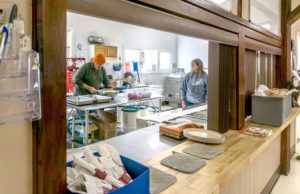This story was written by Quintin Ellison, originally published in The Sylva Herald.

The Community Table’s Kitchen Manager Gary Wood prepares cornbread to help feed the needy and homeless during life-threatening cold of early 2018. Photo by Quintin Ellison.
Along with cooking for the local soup kitchen’s regular clientele, Gary Wood was hard at work Tuesday preparing enough chili and cornbread to serve an extra 39 people – Jackson County’s homeless.
Those facing the vicious cold without homes are finding shelter in local motels. And they get at least this one hot meal a day, thanks to Wood, who is The Community Table’s kitchen manager, with help from the small nonprofit’s volunteer members. The crew is stretched thin with the additional tasks, but with temperatures at night plummeting into the single digits, he said it’s critical people receive the help they require to survive.
The Community Table served 170 meals total during its previous serving day. Tuesday looked to be about the same.
“I want to feed folks,” Wood said as he poured milk into a large, stainless-steel bowl filled with cornmeal. “I’m trying to do as much as I can for as little as I can.”
The motel rooms are used as part of a contract agreement between the Jackson County Board of Commissioners and Southwestern Child Development Commission. This marks the Webster-based nonprofit’s first winter handling case management and housing for the county’s homeless, replacing Jackson Neighbors in Need, a volunteer organization providing home weatherization and heating assistance.
Southwestern Commission has undertaken case management since November 2016, said Marilyn Chamberlin, director of operations and development. The cold-weather shelter program started last Nov. 1.
By “assisting people who are homeless with finding housing, employment and transportation throughout the summer months as well as winter, we believe that reduced the number that needed shelter in the winter,” she said.
Through Dec. 27, Southwestern Commission had provided shelter to 34 people: 15 females, 11 males and eight children, spending $30,000, according to Chamberlin.
“We are using the Quality Inn for most of our homeless, but we offer parents the opportunity to go to the Microtel, because some of our clients have criminal records or substance-use recovery issues and parents may not want children exposed,” Chamberlin said. “We are also trying to manage this number of people, as we budgeted for 10 rooms and at this point are at 15 rooms. When possible we have been doubling up in rooms and we are having people locate housing as fast as we can.”


